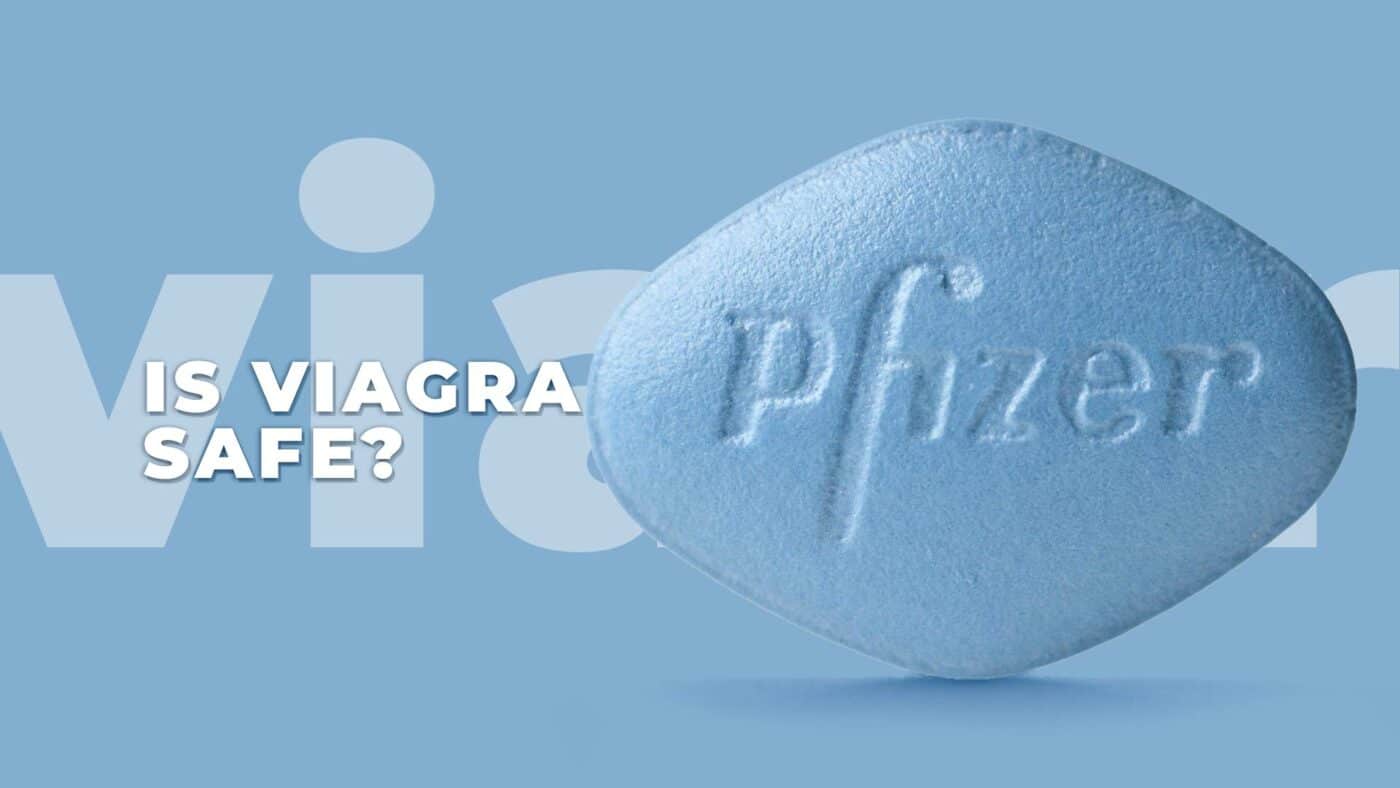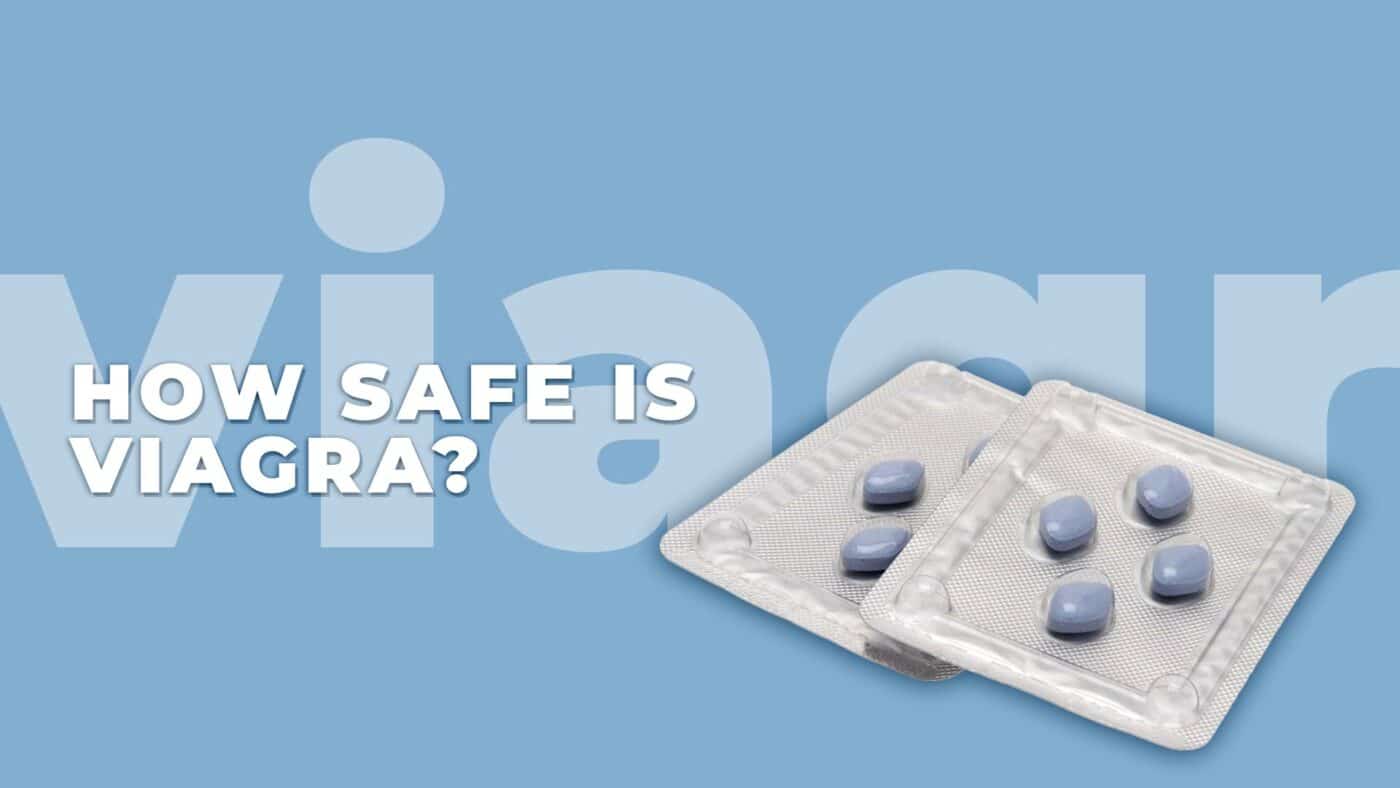The Pros and Cons of Popping Viagra

Viagra is a prescription drug for erectile dysfunction (ED) in males above 18 years. It contains sildenafil, which belongs to a class of drugs called phosphodiesterase type 5 (PDE5) inhibitors.[1] Viagra works by increasing blood flow to the penis, which helps you have and keep an erection.[2] However, it may cause side effects, including light sensitivity and diarrhea. Viagra is approved to treat sexual dysfunction in men by the U.S. Food and Drug Administration (FDA), but it is sometimes prescribed to women off-label, which means without approval by the FDA. It is essential to talk to a doctor before using Viagra to ensure it is safe.
Table of Contents
How Does Viagra Work?
Viagra contains sildenafil, which belongs to a group of drugs called phosphodiesterase type 5 (PDE5) inhibitors. PDE5 is an enzyme that regulates certain chemicals in the blood, which helps a man to get and keep an erection. Viagra works by increasing blood flow to the penis, which helps a man have and maintain an erection when he is sexually aroused.[2] When a man is sexually aroused, muscles in the penis relax to allow greater blood flow, leading to an erection. Also, Viagra does not result in an erection without sexual stimulation.
How often should you take Viagra?
The recommended dosage of Viagra for erectile dysfunction (ED) is 50 mg, taken as needed about one hour before sexual activity. It can be taken 30 minutes to four hours before sexual activity.[3] The medication is most effective when taken on an empty stomach. The maximum recommended dose is 100 mg daily, which may be adjusted based on the patient’s response and tolerability. Viagra should not be taken more than once daily. The duration of the effect of Viagra varies from person to person, but it typically lasts for four to five hours or more if a man has mild to moderate erectile dysfunction.
How Safe Is Viagra?

Viagra is generally considered safe for use when prescribed by a healthcare provider. However, taking too much Viagra or too frequently may increase the risk of side effects. Viagra may not be safe for use by certain patients, such as those with heart disease or heart rhythm problems, coronary artery disease, a heart attack, stroke, congestive heart failure, high or low blood pressure, liver or kidney disease, or a blood cells disorder such as sickle cell anemia, multiple myeloma, or leukemia. It is essential to talk to a doctor before using Viagra to ensure it is safe.
At What Age Can You Take Viagra?
Viagra is approved for use in males aged 18 and older with erectile dysfunction (ED). There is no upper age limit for taking Viagra; studies have shown that men over 70 can safely assume it.[4] However, age can affect the dosage of Viagra that is recommended for an individual. As people get older, their heart, liver, and kidneys may not work as well as they once did, which can cause their body to break down drugs slower than a younger adult’s body. As a result, drugs stay longer in the body, raising the risk of side effects. If a person is 65 years or older, their doctor may start them on a lower dosage of Viagra, typically 25 mg, as a single dose no more than once a day, one hour before sexual intercourse. For a 30-year-old who has no other medical conditions, the typical starting dosage would be 50 mg. Viagra should only be taken under the supervision of a doctor, and patients should talk to their doctor before use to ensure that it is safe for them.
What are the Side-Effects of Viagra?

Viagra may cause some unwanted side effects, including headache, flushing, stuffy nose, indigestion, mild vision-related side effects, sensitivity to light, muscle aches, heartburn, nosebleeds, flushed skin, problems falling asleep, tingling in the arms, feet, and legs, or hands, lightheadedness, and dizziness.[5] In rare cases, Viagra can cause fainting. Some men taking PDE5 inhibitors report back or muscle pain. If a person has heart problems and experiences severe dizziness, fainting, chest/jaw/left arm pain, or nausea while having sex, they should immediately stop and get medical help. In rare cases, Viagra can decrease blood flow to the eye’s optic nerve, causing sudden vision loss.[6] This has occurred in a small number of people taking sildenafil, most of whom also had heart disease, diabetes, high blood pressure, high cholesterol, or specific pre-existing eye problems, and those who smoked. It is important to note that these side effects are not experienced by everyone who takes Viagra, and some people may experience different side effects. If a person experiences any side effects and it becomes severe, they should contact their doctor immediately.
Can Viagra Cause Drug Interactions?
Yes, Viagra can cause drug interactions with other medications.[7] For example, it may interact with blood pressure drugs, such as nitrates, alpha-blockers, and certain antifungal and antibiotic medications. Taking Viagra with these medications can cause a sudden and dangerous drop in blood pressure. Let your doctor know about all the medicines you are taking, including prescription and over-the-counter drugs, vitamins, and herbal supplements, before starting Viagra. Your doctor can help determine if Viagra is safe with your current medications. Additionally, Viagra should not be taken with grapefruit or grapefruit juice, as it can increase the levels of sildenafil in the blood and increase the risk of side effects. Moreover, follow your doctor’s instructions carefully when taking Viagra and promptly report any side effects or concerns to your doctor.
Is Viagra Bad for Your Heart?
Viagra can be bad for the heart if a person has pre-existing heart problems or takes certain medications for heart conditions. Sexual activity can strain the heart, especially if a person has heart problems. However, some studies have suggested that Viagra and other phosphodiesterase type 5 (PDE5) inhibitors may benefit heart failure by decreasing pulmonary artery resistance and providing cardio-protective effects in specific settings.[8] Discuss with your doctor before taking Viagra if you have any pre-existing heart conditions or are taking medications for heart problems. Your doctor can help determine if Viagra is safe and can monitor your heart health while taking the medication.
Can Viagra Damage Your Penis?
In rare cases, Viagra can cause a prolonged and painful erection that lasts longer than four hours, a condition known as priapism.[9] If left untreated, priapism can cause permanent damage to the penis. However, this side effect is rare and typically only occurs in men with pre-existing medical conditions or who take high doses of Viagra. The effects of Viagra on the body are temporary and will not result in a permanently hard or enlarged penis. Viagra can help prevent penis bending and scarring if taken early.[10] If a person experiences a prolonged or painful erection while taking Viagra, they should seek medical attention immediately to avoid permanent damage to the penis. It is essential to follow your doctor’s instructions carefully when taking Viagra and promptly report any side effects or concerns to your doctor.
The Final Thought
Viagra can be a safe and effective treatment for erectile dysfunction. It is essential to be aware of its potential risks and side effects and to discuss any underlying health conditions with a healthcare provider before starting treatment. Alternatives to Viagra may also be worth exploring, depending on individual needs and preferences. With proper care and consideration, men can decide whether Viagra or other treatments are the right choices.
References
- Huang SA, Lie JD. Phosphodiesterase-5 (PDE5) Inhibitors In the Management of Erectile Dysfunction. P T. 2013 Jul;38(7):407-19. PMID: 24049429; PMCID: PMC3776492. https://www.ncbi.nlm.nih.gov/pmc/articles/PMC3776492/
- SAINI, J.S. and GARG, M.K. (2001) “Viagra : Is it a wonder drug ?,” Medical Journal Armed Forces India, 57(1), pp. 44–46. Available at: https://doi.org/10.1016/s0377-1237(01)80090-3
- Viagra (sildenafil): Side effects, dosage, how long it lasts, and more (no date) Medical News Today. MediLexicon International. Available at: https://www.medicalnewstoday.com/articles/viagra#about
- M. FUJISAWA & K. SAWADA (2004) CLINICAL EFFICACY AND SAFETY OF SILDENAFIL IN ELDERLY PATIENTS WITH ERECTILE DYSFUNCTION, Archives of Andrology, 50:4, 255-260, DOI: 10.1080/01485010490448589 https://www.tandfonline.com/doi/abs/10.1080/01485010490448589
- LIM, P.E.T.E.R.H.C., MOORTHY, P. and BENTON, K.E.N.N.E.T.H.G.F. (2002) “The Clinical Safety of Viagra,” Annals of the New York Academy of Sciences, 962(1), pp. 378–388. Available at: https://doi.org/10.1111/j.1749-6632.2002.tb04082.x
- Ausó, E., Gómez-Vicente, V. and Esquiva, G. (2021) “Visual side effects linked to sildenafil consumption: An update,” Biomedicines, 9(3), p. 291. Available at: https://doi.org/10.3390/biomedicines9030291
- Sildenafil (Viagra) drug interactions. Proj Inf Perspect. 1998 Sep;(25):16. PMID: 11365844. https://pubmed.ncbi.nlm.nih.gov/11365844/
- Bhatia, S. et al. (2003) “Immediate and long-term hemodynamic and clinical effects of sildenafil in patients with pulmonary arterial hypertension receiving vasodilator therapy,” Mayo Clinic Proceedings, 78(10), pp. 1207–1213. Available at: https://doi.org/10.4065/78.10.1207
- Silberman M, Stormont G, Leslie SW, et al. Priapism. [Updated 2023 Jan 31]. In: StatPearls [Internet]. Treasure Island (FL): StatPearls Publishing; 2023 Jan-. Available from: https://www.ncbi.nlm.nih.gov/books/NBK459178/
- Barrett-Harlow B, Wang R. Oral therapy for Peyronie’s disease, does it work? Transl Androl Urol 2016;5(3):296-302. doi: 10.21037/tau.2016.03.24 https://tau.amegroup
Disclaimer
HisBlue is not a substitute for professional medical care or advice from your doctor. The health information on the HisBlue website is general and provided for your information only. We have ensured our content is accurate and current, with reviews by expert doctors. However, we cannot guarantee its accuracy or timeliness. This information is not meant to replace the diagnosis, treatment, or judgement of your doctor or another qualified healthcare provider.


